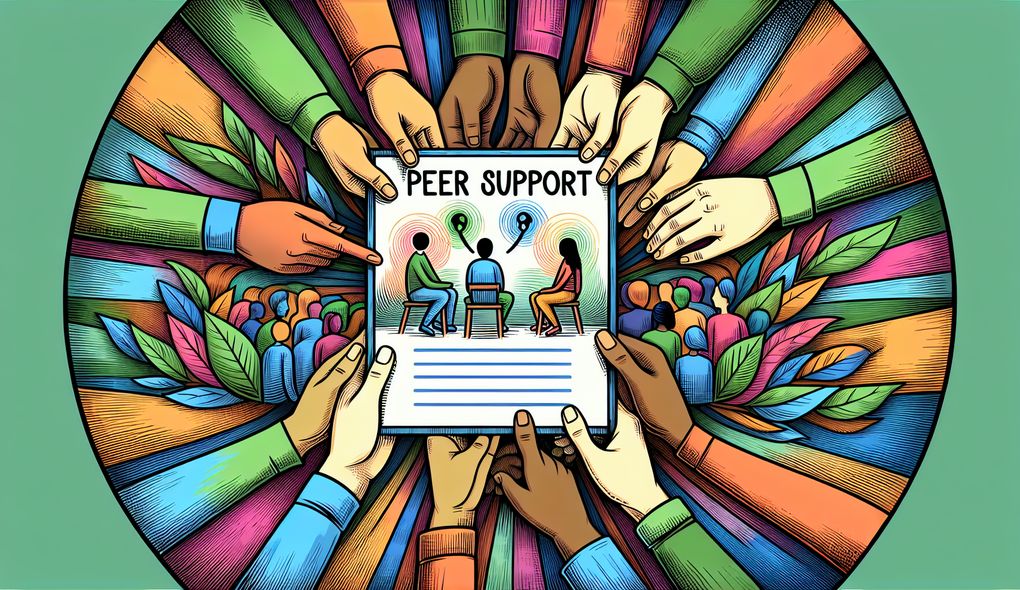How do you encourage peers to actively participate in their recovery process?
JUNIOR LEVEL

Sample answer to the question:
To encourage peers to actively participate in their recovery process, I would start by creating a supportive and non-judgmental environment. I would engage in active listening and show empathy towards their experiences. I would share my own recovery story and experiences to let them know they are not alone. I would provide encouragement and recognition for their progress, highlighting their strengths and achievements. I would also offer practical resources and tools that have helped me in my own recovery journey. Additionally, I would facilitate group discussions and workshops where peers can share their challenges and successes, fostering a sense of community and support.
Here is a more solid answer:
To actively engage peers in their recovery process, I would first establish a trusting and inclusive atmosphere by practicing active listening and showing genuine empathy towards their struggles. Drawing from my own experiences, I would openly share my recovery journey, emphasizing the hurdles I overcame and the coping strategies I developed. This would help create a connection and let them know that recovery is possible. I would also encourage them to set personal goals and support them in developing individualized recovery plans. By providing practical resources, such as self-help books, online forums, and local support groups, I would empower peers with additional tools to aid their recovery. Additionally, I would organize regular group sessions and workshops where peers can share their challenges and successes, as well as learn from one another. Collaborating with a multidisciplinary team, I would ensure comprehensive support by coordinating services like counseling, vocational training, and healthcare. By documenting progress and interactions, I would contribute to data-driven decision-making and facilitate ongoing improvement of the program.
Why is this a more solid answer?
The solid answer expands on the basic answer by providing more specific details and examples. It mentions establishing trust and inclusivity, sharing personal recovery journey, supporting peers in setting goals and developing recovery plans, providing practical resources, organizing group sessions and workshops, and collaborating with a multidisciplinary team. However, it could further improve by including anecdotes or success stories to make it more engaging and impactful.
An example of a exceptional answer:
Encouraging peers to actively participate in their recovery process requires creating a safe space where they feel heard, understood, and empowered. To accomplish this, I would actively listen, validate their experiences, and maintain an open and non-judgmental attitude. As a Peer Support Specialist, I would leverage my personal lived experiences with mental health recovery and substance use challenges to establish rapport and credibility. By vulnerably sharing my journey, I would inspire hope and demonstrate resilience, making their recovery goals feel tangible. To collaboratively develop recovery plans, I would incorporate their strengths, preferences, and values, capturing their ownership and commitment. Furthermore, I would provide them with evidence-based resources, such as books, articles, and mobile applications, tailored to their specific needs. By facilitating group sessions and workshops, I would foster a sense of belonging and community, encouraging peers to share their stories, learn from one another, and celebrate achievements together. Moreover, I would proactively collaborate with therapists, psychiatrists, and other professionals in the multidisciplinary team to ensure a holistic support approach. By regularly documenting peer progress and interactions, I would contribute to the program's effectiveness evaluation and continuous improvement efforts. Ultimately, my goal would be to empower peers to embrace their recovery journey, cultivating resilience, self-compassion, and healthy coping skills.
Why is this an exceptional answer?
The exceptional answer not only covers all the key points from the job description and evaluation areas but also includes additional elements such as creating a safe space, incorporating strengths and values, providing evidence-based resources, fostering a sense of belonging and community, proactively collaborating with other professionals, and promoting resilience and healthy coping skills. The answer is detailed and demonstrates a deep understanding of the role and responsibilities of a Peer Support Specialist.
How to prepare for this question:
- Reflect on your own recovery journey and identify key insights or strategies that have helped you.
- Stay updated on the latest research and evidence-based practices in mental health and substance abuse recovery.
- Practice active listening skills and empathetic communication.
- Familiarize yourself with local support groups, community resources, and self-help tools that you can recommend to peers.
- Develop your facilitation and group management skills by volunteering or participating in relevant workshops or training programs.
- Be prepared to share personal anecdotes or success stories to inspire and connect with peers.
What are interviewers evaluating with this question?
- Interpersonal and communication skills
- Empathy and ability to relate to others' experiences
- Understanding of recovery processes and wellness strategies
- Ability to facilitate groups and work collaboratively

